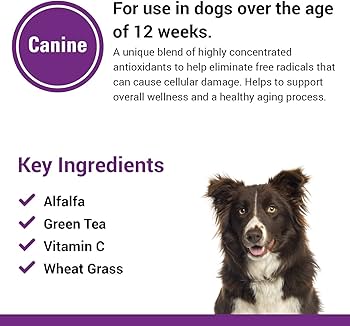Content Menu
● Understanding Green Tea Extract
>> Benefits of Green Tea Extract for Dogs
● Risks Associated with Green Tea Extract
● How to Safely Introduce Green Tea Extract to Your Dog's Diet
● How to Prepare Green Tea for Dogs
>> Recommended Dosage
● Additional Benefits of Green Tea for Dogs
● Conclusion
● FAQ
>> 1. Can all dogs have green tea extract?
>> 2. What are the signs of caffeine toxicity in dogs?
>> 3. How much green tea extract is safe for my dog?
>> 4. Are there any alternatives to green tea extract for my dog's health?
>> 5. Can I give my dog regular brewed green tea?
● Citations:
As pet owners, we often seek ways to enhance our dogs' health and well-being. One popular option that has gained attention is green tea extract. While humans have enjoyed the benefits of green tea for centuries, the question arises: Can dogs take green tea extract? This article explores the potential benefits, risks, and safe usage of green tea extract for our canine companions.

Understanding Green Tea Extract
Green tea extract is derived from the leaves of the *Camellia sinensis* plant. It is rich in antioxidants, particularly catechins, which are believed to offer various health benefits. The most notable catechin in green tea is epigallocatechin gallate (EGCG), known for its anti-inflammatory and anti-cancer properties. However, while these benefits are well-documented in humans, the effects on dogs are less clear.
Benefits of Green Tea Extract for Dogs
- Antioxidant Properties: Green tea extract contains powerful antioxidants that can help combat oxidative stress in dogs, potentially reducing the risk of chronic diseases.
- Anti-Inflammatory Effects: The anti-inflammatory properties of EGCG may assist in managing conditions such as arthritis or skin allergies.
- Cancer Prevention: Some studies suggest that green tea extract may inhibit tumor growth and support overall immune function, making it a potential ally for dogs battling cancer.
- Dental Health: Green tea can help improve oral hygiene by reducing bacteria in the mouth, which can lead to fresher breath and healthier gums.
- Weight Management: The metabolism-boosting effects of green tea may aid in weight management for overweight dogs.
- Immune System Support: Antioxidants in green tea can bolster your dog's immune system, making it more resilient against infections and diseases[1][2].
Risks Associated with Green Tea Extract
Despite its potential benefits, there are significant risks associated with giving dogs green tea or its extracts:
- Caffeine Sensitivity: Green tea contains caffeine, which can be toxic to dogs. Even small amounts can lead to symptoms such as hyperactivity, vomiting, and increased heart rate. Dogs metabolize caffeine differently than humans, making them more sensitive to its effects[3][8].
- Gastrointestinal Issues: High doses of green tea extract can cause gastrointestinal upset in dogs, leading to diarrhea or vomiting.
- Liver Toxicity: Research indicates that concentrated forms of green tea extract can cause liver damage in dogs, especially if consumed on an empty stomach. A study found that fasting dogs given high doses of green tea extract experienced severe liver toxicity[10].
How to Safely Introduce Green Tea Extract to Your Dog's Diet
If you decide to incorporate green tea extract into your dog's diet, it's crucial to do so safely:
1. Consult Your Veterinarian: Always discuss any new supplement with your veterinarian before introducing it to your dog's diet. They can provide guidance based on your dog's specific health needs.
2. Use Decaffeinated Green Tea: If you choose to give your dog green tea, opt for decaffeinated versions to minimize the risk of caffeine toxicity[1].
3. Start with Small Amounts: Introduce green tea gradually and monitor your dog for any adverse reactions. A small amount mixed into their food can be a good starting point.
4. Monitor for Side Effects: Keep an eye on your dog for any signs of distress or discomfort after consuming green tea extract. If you notice any negative reactions, discontinue use immediately and consult your veterinarian.
5. Avoid Fasting Before Administration: To reduce the risk of toxicity, ensure that your dog has recently eaten before giving them green tea extract[6].

How to Prepare Green Tea for Dogs
If you want to prepare green tea for your dog at home, follow these steps:
1. Pour 1 liter of cold water into a glass pitcher.
2. Insert 1 tea bag (preferably organic) or 1 tablespoon of loose leaves.
3. Steep for about 15 minutes.
4. Remove the tea bag and store the mixture in the fridge; it stays fresh for up to three days.
5. Offer it in a bowl alongside regular water[7].
Recommended Dosage
The recommended dosage varies based on your dog's size:
- For small dogs: 1-2 tablespoons per day
- For medium dogs: 1/8 cup per day
- For large dogs: 1/4 cup per day
It's essential not to exceed these amounts and always consult with a veterinarian before starting any new supplement regimen[2][5].
Additional Benefits of Green Tea for Dogs
In addition to the previously mentioned benefits, research has shown that green tea may also help with:
- Skin Conditions: The anti-inflammatory properties can soothe skin irritations and allergies in dogs.
- Digestive Health: Green tea may aid digestion and help alleviate issues like diarrhea or constipation by promoting a healthy gut flora[6][9].
- Cognitive Function: Some studies suggest that EGCG may have neuroprotective effects that could benefit aging dogs by improving cognitive function and reducing the risk of neurodegenerative diseases[6].
Conclusion
In conclusion, while green tea extract offers several potential health benefits for dogs due to its antioxidant and anti-inflammatory properties, it also poses significant risks primarily due to caffeine sensitivity and potential liver toxicity. Therefore, it is essential to approach this supplement with caution and always consult a veterinarian before introducing it into your dog's diet.

FAQ
1. Can all dogs have green tea extract?
Not all dogs can safely consume green tea extract due to their sensitivity to caffeine and other components. Always consult with a veterinarian first.
2. What are the signs of caffeine toxicity in dogs?
Signs include hyperactivity, vomiting, rapid breathing, increased heart rate, and tremors. If you suspect caffeine toxicity, seek veterinary care immediately.
3. How much green tea extract is safe for my dog?
The safe dosage varies based on the dog's size and health condition; consult your veterinarian for personalized recommendations.
4. Are there any alternatives to green tea extract for my dog's health?
Yes! Other supplements like fish oil or turmeric may offer similar anti-inflammatory benefits without the risks associated with caffeine.
5. Can I give my dog regular brewed green tea?
While small amounts of decaffeinated brewed green tea may be safe for some dogs, it's best to consult your vet before introducing it into their diet.
Citations:
[1] https://matcha.com/blogs/news/matcha-and-pets-is-matcha-safe-for-pets
[2] https://blog.adoredbeast.com/green-tea-for-dogs-benefits-and-uses/
[3] https://fotp.com/learn/dog-supplements/the-benefits-of-green-tea-for-dogs
[4] https://helpingpetslivelonger.com/products/green-tea-capsules-725-mg-decaf-60
[5] https://www.thedogbakery.com/blogs/news/is-green-tea-safe-for-dogs-everything-you-need-to-know-about-this-miracle-drink
[6] https://ivcjournal.com/why-do-integrative-vets-love-green-tea-extract/
[7] https://www.bowbottomvet.com/2015/06/12/new-article-how-to-make-green-tea-for-your-dog-or-cat/
[8] https://www.dogster.com/dog-nutrition/can-dogs-have-green-tea
[9] https://wagwalking.com/wellness/should-i-give-my-dog-green-tea
[10] https://peterdobias.com/blogs/blog/is-green-tea-toxic-to-dogs






























